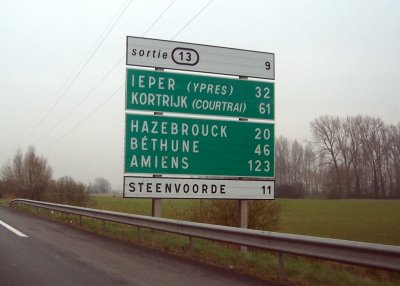
WWII: Maginot Line | Normandy | V-Weapon Sites | Arnhem
Further afield: Crete
| Home Tracing Military Ancestors Travel Advice CWGC Cemeteries Iron Harvest News Book Reviews Glossary Links Contact Me Ypres:
 
|
A Note on Belgian Place-NamesAlthough Belgium has existed as a single country since the 1830’s, it has two languages – French and Flemish. French speakers (around 40% of the population) sometimes called “Walloons”, live mainly in the south and east of the country. Flemish speakers (the remaining 60%) dominate the north and west including Flanders and the Channel Coast. This divide reflects the complex history of the region, which has at various times in the last 500 years been dominated by the Spanish, French, Dutch (to which Flemish is a related language) and the Germans. Up to the First World War the official language of Belgium was French and towns and cities were named accordingly – Ypres, Courtrai, Roulers, Gand, Dixmude etc. However, the fighting, particularly in the Flemish heartlands of the Yser and on the coast, fostered a new sense of national identity in the Flemish-speaking majority. Soldiers in the Belgian Army (80% of whom were Flemish-speakers) began to resent orders being given to them in French by the mainly French-speaking officer class. The issue came to a head in 1917 when Flemish nationalists sent a letter to the King asking that the rights of their language be recognised. The King, only too aware that such a concession may have led to the complete collapse of the army, ignored it. Anyone with Flemish nationalist leanings was brutally repressed, creating a number of “Flemish Martyrs”. After the war the issue rumbled on until, eventually, in the late 1930’s language laws were introduced which met many of the nationalists’ demands. Today most of the key towns and cities in northern and western Belgium have primary Flemish place-names with the old French names usually following in brackets. Hence Ypres, Courtrai, Roulers, Gand and Dixmude have become Ieper, Kortrijk, Roeselare, Ghent and Diksmuide.
To avoid confusion I have used the French spelling of a place-name if discussing that location in the context of the war years (e.g. the Brief History and Historical Notes) and the Flemish spelling when explaining directions and the like in the context of today. Lastly, for those visiting the Ypres Salient, please speak to local people in English unless you know some Flemish. Do not speak French – it will not be appreciated! |
